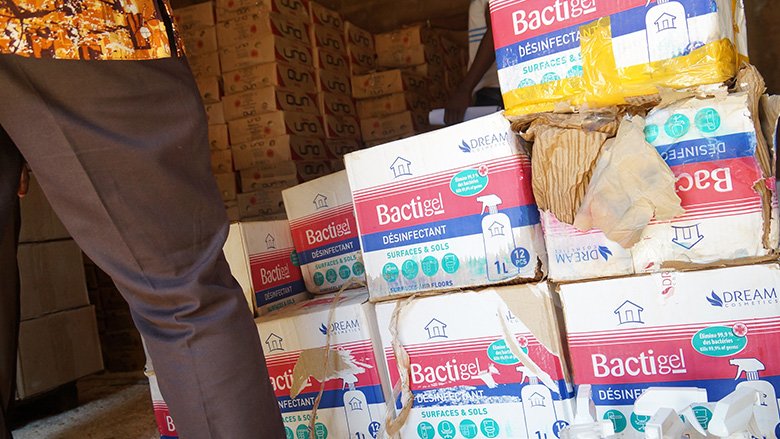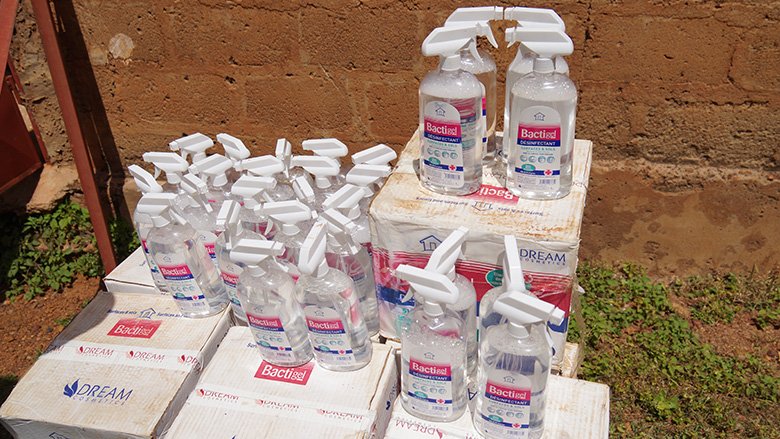Challenge
In 2020, Burkina Faso was classified as a fragile and conflict-affected situation as the security environment deteriorated. The country witnessed a staggering increase in the number of IDPs, from 30,000 in June 2018 to 1.4 million by September 2021 — the highest number in the Sahel region. The lock-down in response to the COVID-19 pandemic led to the decline in the State's own-source revenues. At the same time, the government prioritized COVID-19-related expenditures. As a result, fiscal transfers to municipalities were delayed and/or reduced. In addition, the closure of municipalities’ markets and slaughterhouses led to a sharp drop in their own revenues amounting to about 60 percent (*) in March and April 2020.
Approach
The project aimed to strengthen the decentralization capacity of the Burkina Faso’s central government, as well as the institutional capacities of the municipalities in 13 regions. It also aimed to improve accountability linkages between local policy makers and citizens in these municipalities. Additionally, with the onset of challenges, including a security crisis and the COVID-19 pandemic, the project provided resources to municipalities to contain the spread of COVID-19, support IDPs, and ensure the continuity of social services. The project adopted a dynamic approach to institutional development to ensure an appropriate enabling policy, regulatory and fiscal environment. The Adaptable Program Loan adopted by the project provided continuity and the long-term sustained support required for effective decentralization through a phased approach. The project also partnered with humanitarian actors to support IDPs and the COVID-19 response, as well as with the Development Impact Evaluation (DIME) Unit and other partners to develop digital solutions for evidence-based decision-making.
Results
The project contributed to strengthening citizen engagement and public sector accountability, as well as supporting decentralization. It helped to: (i) strengthen the regulatory and institutional framework; (ii) improve the fiscal transfer system between the central and local governments (the timeliness and the amount of transfers doubled from 5 percent in 2017 to 12 percent in 2021); and (iii) bolster the institutional capacities of municipalities in all 13 regions of the country. The project developed a digital tool, the Municipal Performance Monitoring (Suivi de la Performance Municipale - SUPERMUN), to monitor service delivery performance. Project interventions to contain the pandemic, support IDPs and ensure continuity of basic services were consistent with the conflict prevention and resilience agenda, as well as Burkina Faso’s COVID-19 response.
Between August 2020 and September 2021, the project achieved the following results:
- The project delivered essential household items to benefit 60,503 vulnerable households (57 percent of which were woman-headed households).
- The project also delivered essential household items to benefit 423,521 IDPs (58 percent of whom were children). The acquisition of kits for IDPs generated $5.2 million for local producers.
- The project delivered management training for 501 staff, including 89 municipal agents and 196 social workers, in IDP sites. Support for the IDPs was included in municipal institutional development plans for all 349 municipalities.
- The project enabled 349 municipalities to obtain hand-washing facilities, hand sanitizers, public hand-washing stations, as well as products to disinfect markets and schools.
- The project also supported the acquisition of COVID-19 kits.
- The payment of recurrent costs for maintenance, electricity, and water bills freed up to $1.5 million for other investments by the municipalities.
Bank Group Contribution
The project was financed by the International Development Association (IDA) for a total amount of $120 million, including additional financing of $60 million. Support to the IDPs was provided in close collaboration with the Burkina Faso Social Safety Net Project ($166 million). The project provided complementary support for the preparation of the Community-Based Recovery and Stabilization Project for the Sahel ($352.5 million). It also complemented the COVID-19 Preparedness and Response Project ($21.15 million).
Partners
The project partnered with the United Nations High Commissioner for Refugees (UNHCR) to build national capacity at the central and local levels to purchase and distribute essential household items to IDPs, as well as to strengthen the capacities of municipal agents in the IDPs’ camp management. The National Council for Emergency Relief and Rehabilitation (CONASUR) was the entity responsible under the project for targeting IDPs and kit distribution. The Central Purchasing Center for Generic Essential Drugs and Medical Consumables, CAMEG, provided anti-COVID-19 kits.
The government also collaborated with DIME, Digital Development (DD), and the German Institute for Global and Area Studies (GIGA) to develop the SUPERMUN platform.
Looking Ahead
As the World Bank helps Burkina Faso to implement the next generation of reforms concerning local governance, a results-based approach can help to ensure the delivery of quality public services. Building on the foundation of this project, the next phase of decentralization reform in Burkina Faso can focus on providing stronger incentives to the central government to transfer resources and competencies to municipalities and deconcentrated structures; tying fiscal transfers to performance and accountability for results; and empowering citizens by providing them with the means to hold local governments accountable for their performance. These efforts can be supported through a follow-up operation to strengthen external monitoring, control, and feedback for program implementation at the local level. Support to decentralization reforms remains critical to strengthening the trust between citizens and the state at the local level. These long-term reforms would also place the citizen at the center of public action. The main exogenous challenges to reform remain the security and COVID-19 crises, which have placed additional strains on the central government budget. By extension, these crises can also hamper the transfer of resources to the municipalities.
Beneficiary Story/Quote
Nicolas Maistre, UNHCR Technical Partner
“The project contributed to the formalization of the Camp Coordination and Camp Management (CCCM) Cluster in June 2021 following two years of discussions between the government, the UN System, and the humanitarian community. This cluster will provide an environment of protection and adequate assistance for IDPs and those affected by displacement. [It will also] promote community engagement… and strengthen the capacity of actors responsible for camp management.”
Aziz Diallo, Mayor of Dori, Sahel region:
“By covering [the] recurring costs of communes, the project helped free up fiscal space and redirect 60-70 percent of investment resources toward priority development needs,[including]: hydraulic facilities, access to water, agriculture and pastoralism.”
* Government of Burkina Faso, Estimate from the Directorate General of Tax (DGI).



